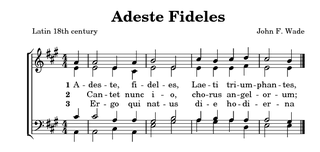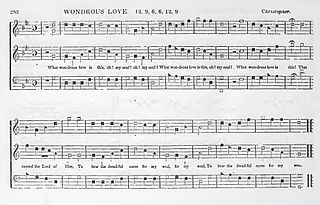The Apostles' Creed, sometimes titled the Apostolic Creed or the Symbol of the Apostles, is a Christian creed or "symbol of faith".

A hymn is a type of song, and partially synonymous with devotional song, specifically written for the purpose of adoration or prayer, and typically addressed to a deity or deities, or to a prominent figure or personification. The word hymn derives from Greek ὕμνος (hymnos), which means "a song of praise". A writer of hymns is known as a hymnist. The singing or composition of hymns is called hymnody. Collections of hymns are known as hymnals or hymn books. Hymns may or may not include instrumental accompaniment. Polyhymnia is the Greco/Roman goddess of hymns.
The Penitent Thief, also known as the Good Thief, Wise Thief, Grateful Thief, or Thief on the Cross, is one of two unnamed thieves in Luke's account of the crucifixion of Jesus in the New Testament. The Gospel of Luke describes him asking Jesus to "remember him" when Jesus comes into his kingdom. The other, as the impenitent thief, challenges Jesus to save himself and both of them to prove that he is the Messiah.

The Te Deum is a Latin Christian hymn traditionally ascribed to a date before AD 500, but perhaps with antecedents that place it much earlier. It is central to the Ambrosian hymnal, which spread throughout the Latin Church with other parts of the Ambrosian Rite of Milan in the 6th to 8th centuries. It is sometimes known as the Ambrosian Hymn, although authorship by Saint Ambrose is unlikely. The term Te Deum can also refer to a short religious service that is based upon the hymn.

"Love Divine, All Loves Excelling" is a Christian hymn by Charles Wesley, first published in 1747. It was initially published as part of his Hymns for Those that Seek and Find and quickly became a central hymn in both Methodist and wider Christian worship. The hymn reflects Wesley's teachings on Christian perfection, expressing a longing for God's transforming and sanctifying grace.
Erik Reginald Routley was an English Congregational churchman, theologian and musician and prominent hymnologist.
"Lord of the Dance" is a hymn written by English songwriter Sydney Carter in 1963. The melody is from the American Shaker song "Simple Gifts" composed in 1848. The hymn is widely performed in English-speaking congregations and assemblies.
Kingdom songs are the hymns sung by Jehovah's Witnesses at their religious meetings. The current hymnal used by the organization is "Sing Out Joyfully" to Jehovah. In addition to the current and previous hymnals containing sheet music and lyrics, releases in various audio formats have included vocals in several languages, piano instrumentals, and orchestral arrangements. The name "Kingdom songs" is in reference to God's Kingdom.

"We Gather Together" is a Christian hymn of Dutch origin written in 1597 by Adrianus Valerius as "Wilt heden nu treden" to celebrate the Dutch victory over Spanish forces in the Battle of Turnhout. It was originally set to a Dutch folk tune. In the United States, it is popularly associated with Thanksgiving Day and is often sung at family meals and at religious services on that day.

Carl Gustav Boberg was a Swedish poet, preacher, government official and member of parliament, best known for writing the Swedish-language poem "O Store Gud" from which the English language-hymn "How Great Thou Art" is derived.
"How Great Thou Art" is a Christian hymn based on an original Swedish hymn entitled "O Store Gud" written in 1885 by Carl Boberg (1859–1940). The English version of the hymn and its title are a loose translation by the English missionary Stuart K. Hine from 1949. The hymn was popularised by George Beverly Shea and Cliff Barrows during Billy Graham's crusades. It was voted the British public's favourite hymn by BBC's Songs of Praise. "How Great Thou Art" was ranked second on a list of the favourite hymns of all time in a survey by Christianity Today magazine in 2001 and in a nationwide poll by Songs Of Praise in 2019.

A hymn tune is the melody of a musical composition to which a hymn text is sung. Musically speaking, a hymn is generally understood to have four-part harmony, a fast harmonic rhythm, with or without refrain or chorus.
Hymnology is the scholarly study of religious song, or the hymn, in its many aspects, with particular focus on choral and congregational song. It may be more or less clearly distinguished from hymnody, the creation and practice of such song. Hymnologists, such as Erik Routley, may study the history and origins of hymns and of traditions of sung worship, the biographies of the women and men who have written hymns that have passed into choral or congregational use, the interrelationships between text and tune, the historical processes, both folk and redactional, that have changed hymn texts and hymn tunes over time, and the sociopolitical, theological and aesthetic arguments concerning various styles of sung worship.
"Jaya Ho" is a Christian hymn written in the Hindi language by an unknown author. The song's Hindi title, more frequently transliterated "Jai ho" in other contexts, means "may there be victory" and is frequently used interjectively to praise God. The hymn's English title is often given as "Victory Hymn" or "Victory Be to You [i.e., God]".

"What Wondrous Love Is This" is a Christian folk hymn from the American South. Its text was first published in 1811, during the Second Great Awakening, and its melody derived from a popular English ballad. Today it is a widely known hymn included in hymnals of many Christian denominations.
"Crown Him with Many Crowns" is an 1851 hymn with lyrics written by Matthew Bridges and Godfrey Thring and sung to the tune 'Diademata' by Sir George Job Elvey. The hymn appears in many hymnals.
"Praise to the Living God" is an American Judeo-Christian hymn written in 1884 by Max Landsberg and Newton Mann. It was revised in 1910 by William C. Gannett.

"Sun of Unclouded Righteousness" is a little-known 1758 Christian hymn written by Charles Wesley, the brother of John Wesley, the founder of Methodism. It was written as an intercessory hymn praying for the salvation of Muslims and calls for their conversion to Christianity. It had fallen out of use by around 1880.
"At the Name of Jesus" is a hymn with lyrics written by Caroline Maria Noel. It was first published in 1870, in an expanded version of Noel's collection The Name of Jesus and Other Verses for the Sick and Lonely. At the time, Noel herself experienced chronic illness, which persisted until her death. The hymn has become popular across Christian denominations, and appears in over 200 hymnals. It has been set to many different tunes, including compositions by William Henry Monk, Ralph Vaughan Williams and Michael Brierley.

"A Charge to Keep I Have" is a hymn written by Charles Wesley. It was first published in 1762 in Wesley's Short Hymns on Select Passages of the Holy Scriptures. The words are based on Leviticus 8:35. It is most commonly sung to the hymn tune Boylston by Lowell Mason.









